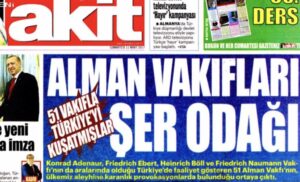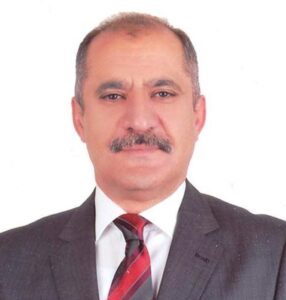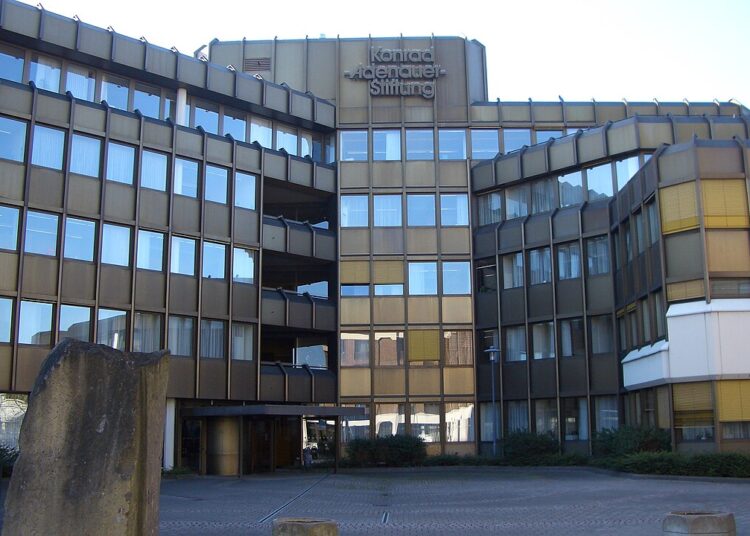Abdullah Bozkurt/Stockholm
A secret report by the Turkish government concerning the activities of German nongovernmental organizations in Turkey has recently resurfaced in the reopened murder case of an academic, putting a spotlight on the anti-German narrative employed by Turkish government officials in recent years.
The 122-page report, stamped secret, includes a detailed analysis of the German Konrad Adenauer Foundation that described the foundation’s work to help promote democracy in Turkey as harmful to the country’s national security and recommended its immediate closure. The report urged the same action for other German foundations that were operating in Turkey as well.
According to the report, Konrad Adenauer was branded as a “German state entity” and its activities in Turkey were deemed a threat to Turkey’s national unity and territorial integrity. The foundation was accused of trying to incite violence and exploit divisions, with its ultimate goal to dismember Turkey along ethnic and religious lines by helping to create separate identities and advocating local governance, the report alleged.
The report also claimed Adenauer had been operating in Turkey illegally since 1983 even though the foundation secured a license from the State Planning Organization (DPT) in 1985.
Cover page of the secret report prepared by the Turkish Interior Ministry about the Konrad Adenauer Foundation:
The Interior Ministry investigators who drafted the report concluded that the DPT licensing of Konrad Adenauer was a mistake and wrong and that as a result its activities must be considered illegal as well. The investigators further claimed that Konrad Adenauer cannot be licensed under Turkish laws that govern foundations, associations and nongovernmental organizations because its very existence was a threat national interests of Turkey and must be shut down immediately.
The report noted that the foundation is funded by the German government, functions as an arm of the German Foreign Ministry and that its work is directed by the German embassy in Turkey. Its Turkey representatives – Wolf Schönbohm, Marx Georg Meier and Lars Peter Schmidt – were described as “so-called representatives,” suggesting that the official leadership was nothing but window dressing.
Turkish nationals and nongovernmental organizations that cooperated with Konrad Adenauer were also targeted in the report. They were branded as “collaborators” whose views echo the policies of the German state as opposed those of Turkey.
Turkish investigators further accused Konrad Adenauer of trying to assimilate the Turkish diaspora in Germany and shape the views of Turkish expatriates in Germany against the Turkish state. “It is obvious that after creating feelings of resentment and hatred [among Turks in Germany] against the [Turkish] state and army, alienating them from their core values and ensuring that Germany is adopted as their homeland, they [Konrad Adenauer’s leaders] aim to cut off their children’s ties with Turkey and subject them to assimilation,” the report stated.
Turkey’s state-controlled media ran headlines against German foundations, calling them an “axis of evil”:

Although the report obtained by Nordic Monitor exclusively covers Konrad Adenauer, its preamble and some references throughout make it clear that other nongovernmental organizations from Germany, the US and other countries were also targeted by the Turkish government. They included the Friedrich Naumann Foundation for Freedom, Friedrich Ebert Foundation, Heinrich Böll Foundation, the Körber Foundation, the Willows Foundation, the United Methodist Committee on Relief, Radio Free Asia, the American Red Cross, the Theodora Foundation and the Latter-day Saints Charities Foundation. Separate reports with similar conclusions were drawn up for every one of them.
“Although the German organizations operating in Turkey under the names of the Konrad Adenauer Foundation, the Friedrich Ebert Foundation, the Heinrich Böll Foundation and the Friedrich Naumann Foundation are extensions of political parties, each of which has a different worldview in their own countries, they are united in pursuing the same goals in our country,” the report stated.
The common goals of all German foundations in Turkey were summarized in the report: They aim to distance Turkey from its national and conservative values, undermine its national identity, provoke divisive issues to incite anarchy and create as many ethnic groups as possible to transform Turkey into a federal state with the eventual goal of dismembering Turkey.
Excerpts from the report on German foundations in Turkey:
The report’s authors were Adnan Kandemir, Abdullah Ciftci, Alaattin Tabur and Mete Derdiyok. Some are still working for the Turkish government, while others retired and moved to the private sector. It was submitted to the Prime Minister’s Office as well as the Chief Prosecutor’s Office at the Ankara State Security Court and the Chief Prosecutor’s Office of the Supreme Court of Appeals on January 24, 2003.
Although the report was very specific in calling for the closure of German foundations in Turkey, the move was thwarted when Turkey’s membership talks with the EU officially started on October 3, 2005. The government of Recep Tayyip Erdogan, which was in desperate need of investment and trade with the EU and under an IMF Standby Agreement, did not want to irritate Germany, the heavyweight in the EU bloc.
As a result, despite vicious targeting and harassment by neo-nationalists who wielded influence over government policies through the judiciary, military, National Security Council and intelligence agency MIT, the government decided to not act on the report’s recommendations. To force Erdogan’s hand, the neo-nationalists even assassinated Necip Hablemitoğlu in 2002 to create the impression that German intelligence was behind the murder.
Excerpts from the report on German foundations in Turkey:
Hablemitoğlu, a hardcore neo-nationalist figure, was leading a campaign against German foundations and companies that were interested in investing in Turkey’s forestland. The information and documents, many of which were fabricated, were provided by military intelligence, which was under the control of the neo-nationalists.
The reopened case of the assassination revealed that the murder was contracted to a unit of the Combat Search and Rescue (MAK), an elite force attached to the Turkish military’s Special Forces Command (ÖKK). However, all suspects in the case were recently released, suggesting that the alliance between the Erdogan government and the neo-nationalists, which was struck in a secret deal in 2014, was still holding.
The old report about the German foundations resurfaced in the reopened investigation. The Ankara Chief Public Prosecutor’s Office asked the Interior Ministry on May 23, 2017 for a copy of the secret report, which was delivered three weeks later. The report was added as evidence in the indictment filed on November 11, 2022 by Ankara public prosecutor Zafer Ergun.

The track record of Erdogan government policies showed that the Turkish government started targeting German foundations again in Turkey in 2011 after Erdogan’s ruling Justice and Development Party (AKP) won a third term with 50 percent of the vote. Feeling comfortable in office and thinking he had consolidated enough power, Erdogan raised the issue during conversations with reporters on a plane en route to Turkey from Macedonia in October 2011.
Then-Foreign Minister Ahmet Davutoğlu also raised similar claims, stating that charitable foundations were funnelling money to the outlawed Kurdistan Workers’ Party (PKK) and that the government was closely monitoring the situation and taking steps to block the transactions. Erdogan also believed Germany was behind the Gezi Park anti-government protests in the summer of 2013 and instructed the intelligence agency to run surveillance on those who were associated with the German foundations and to wiretap their phones.
The campaign against German foundations picked up steam again in March 2017 with the pro-government Yeni Şafak daily stating in a headline story that Turkish authorities would launch an investigation into German foundations in Turkey, claiming that these organizations were involved in intelligence gathering under the cover of a foundation.
Excerpts from the report on German foundations in Turkey:
The newspaper claimed the real blow to the German Federal Intelligence Service (BND)-affiliated foundations operating in every part of the country would be dealt following an April 16, 2017 referendum in which a constitutional reform package was to be put to a vote.
“Most of the 22 foreign foundations that operate in Turkey belong to Germans, and the involvement of these foundations in many terrorist group acts is striking,” the daily wrote without offering any evidence to support the allegations.
Another pro-government daily, Yeni Akit, claimed in a lead story in March 2017 that 51 German foundations including Friedrich Ebert, Konrad Adenauer, Friedrich Naumann and Heinrich Böll were involved in terrorism targeting Turkey.
In April 2017 A-Haber TV, owned by Erdogan’s family, ran a series on German foundations operating in Turkey and accused them of supporting terrorism against the country.
The vicious political campaign against German foundations was personally led by Metin Külünk, an Erdogan confidant and long-time ally who had been accused of running clandestine operations in Germany.
The rhetoric and narrative used by Erdogan government officials in recent years, especially during the election campaign this month, parroted points mentioned in the 2003 report.












